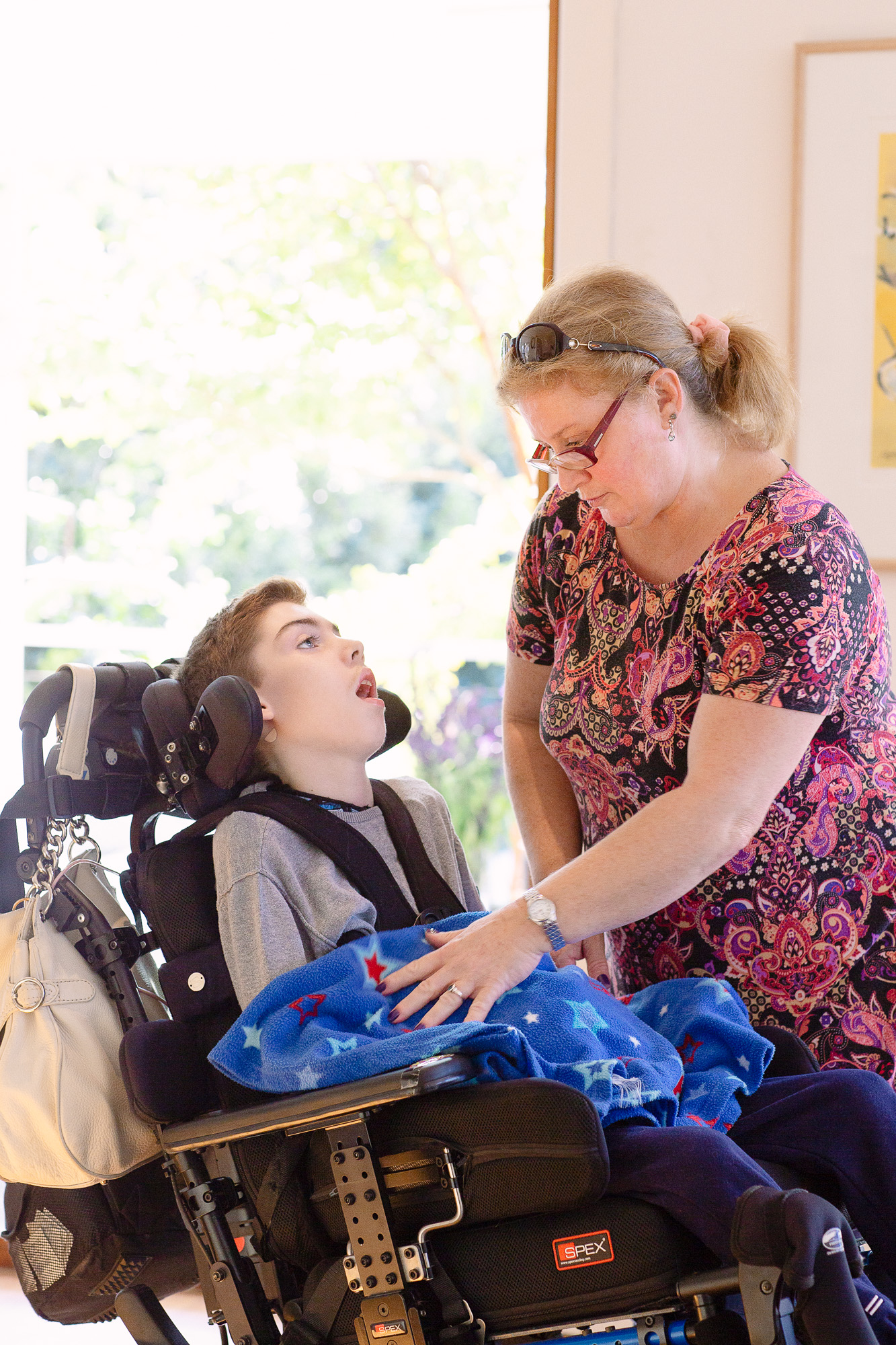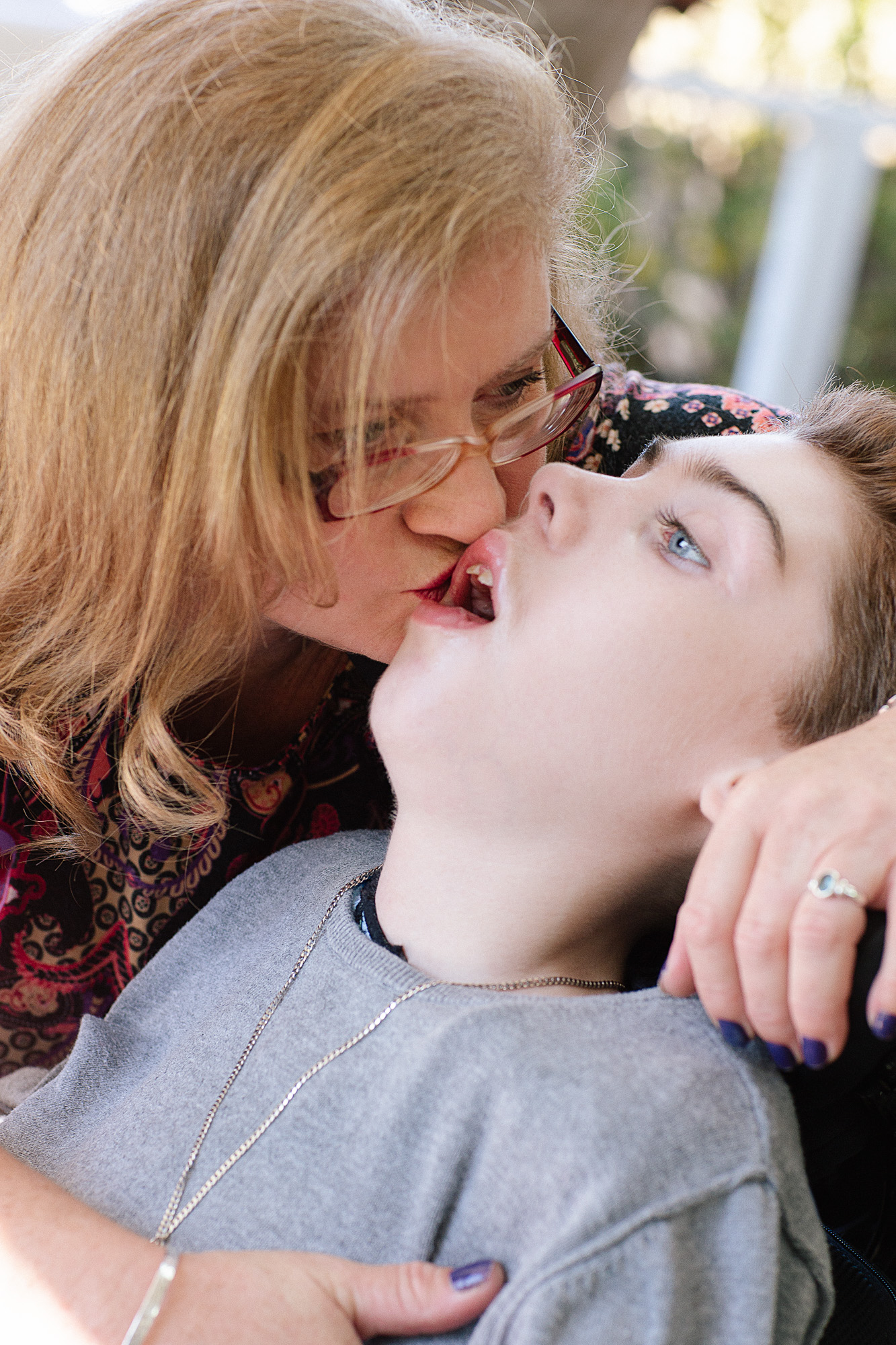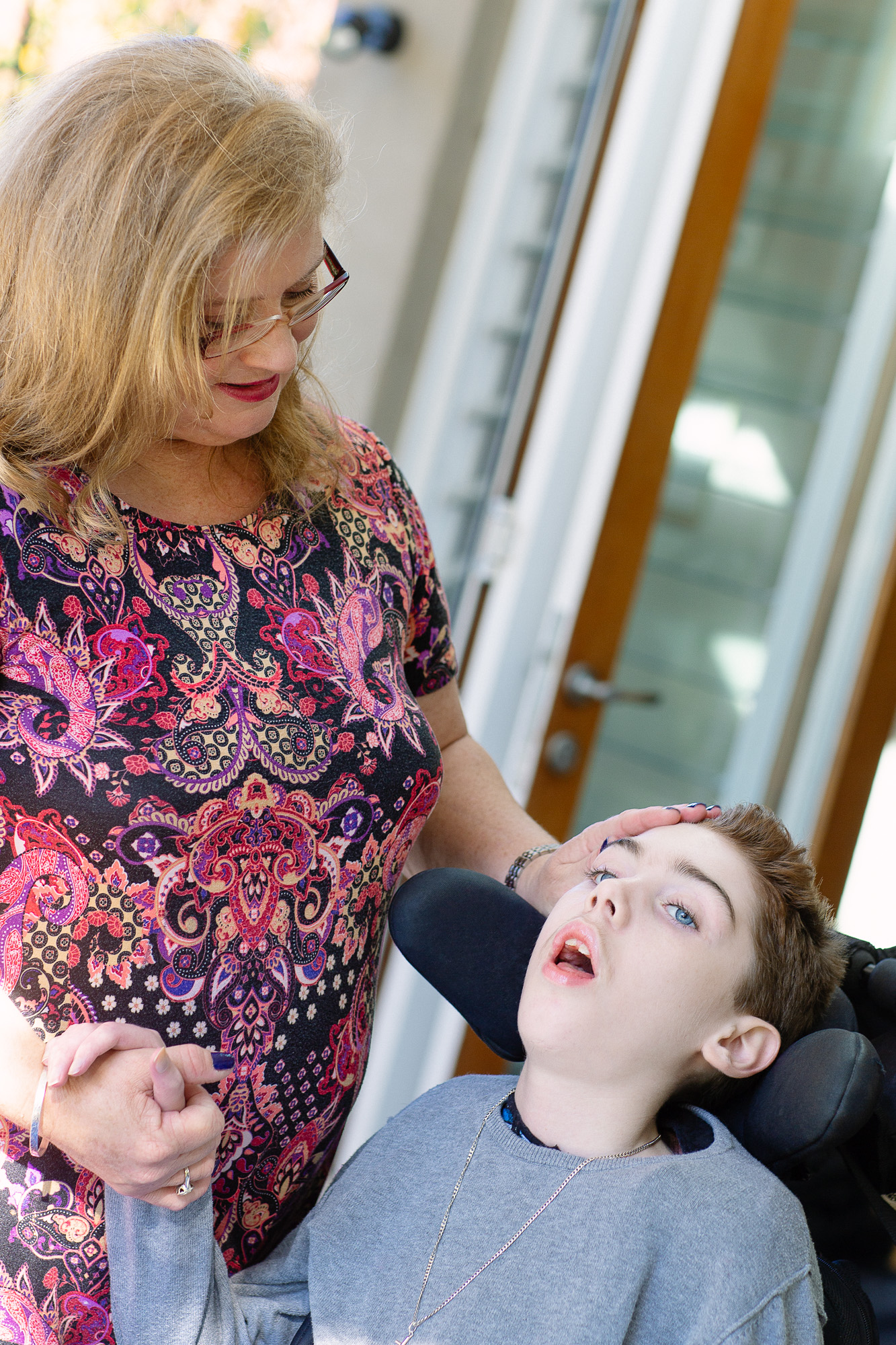What’s a typical day for you?
I have carers morning and afternoon to give Max his personal care – to help me with bed, bath, getting him dressed and up in the wheelchair and giving him his medication, which I make every morning and evening. While all of that’s happening I’m getting Abigail ready for school. It’s a 10-minute drive to Abi’s school and then it’s just Max and I at home. I’ll catch up on emails and phone calls and things like that. Then I’ll do his midday medications, stretches and changing. He goes back to laying down in the middle of the day. But Max’s care is 24/7 now. So, there’s always something to do every hour or every other hour.
What was Max like as baby?
When he was born he was the happiest, most content baby you’ve ever met. He was a giggler. I just fell in love with him and I just walked everywhere with a smile on my face. It must have showed because people were always smiling at me when I walked through the shopping centre. He completed my world.
How did the diagnosis of Battens come about?
From the age of three he started having seizures. We eventually found out from a blood test, two years later, when he was five-and-half. His bloods were sent to Adelaide and it took three months for the results to come back. I was devasted when we found out. I couldn’t believe it – of all the things he could have been diagnosed with it was something that had to be terminal. I cried for the next three days and then I felt some kind of relief because I finally had an answer to what was going on.
So, what happened in the years leading up to the diagnosis?
We saw a paediatrician and then a paediatric neurologist over the next two years. The specialist appointments were six months apart and it seemed to be taking forever. By now I’m pulling my hair out, I’m in tears all the time and it was all I’d ever talk about. I started googling his symptoms and some of the things I was finding were so horrifying that I was working myself up. Max was five now and in status epilepticus – which means seizures non-stop, all day and all night. It was then that our neurologist said, he’s got Battens and I said, ‘No way does my son have a disease.’ That was the way I looked at it. ‘Disease’ was this horrible word. Then I looked it up and (it took me six months to do that). I thought they were barking up the wrong tree. By now Max was losing his gait, and I was carrying him on my back at one stage to get him in to preschool because he wasn’t able to walk the distance anymore.
And did things deteriorate for him quickly from there?
He was wearing a crash helmet whenever he wasn’t in his walker and he had his wheelchair at the age of six. In the meantime, he lost his ability to swallow, walk, talk. When we came out of that hospital admission at five-and-a-half he started dropping the ‘ends’ off his words and it got to the point where I couldn’t understand what he was saying anymore. He lost spatial awareness, he was forever in the wars, it was dreadful. He’d be looking at us with this devastating look like, ‘Mum, what’s happened? I’m trying so hard not to fall over’. Then it was so fast. By seven everything was gone. He couldn’t swallow, he was back in nappies, and he was PEG-fed (a gastrostomy). These days he has GJ (Gastro-Jejunal tube), which bypasses his stomach.
We hear Max is a music fan. Any particular bands?
Max likes all genres – when he was little it was all about the Wiggles. But now he likes AC/DC. Mumford and Sons is another favourite.
Is there anything else he still enjoys doing now?
He still loves to be out. For example, we were at Bear Cottage a week before last and I put him in the car to come home and all the while I’d say, ‘Ok Maxi, we’re going to go in the car now, it’s a big drive home.’ And he just laughed, and coughed, and coughed and laughed all the way home. I pulled over 10 times to suction him, but he was so happy, I wasn’t stressed about it. And he loves his car, too. We call it ‘Maxi’s Car’ because it’s our first wheelchair vehicle.
Tell us about Bear Cottage.
Bear Cottage is my lifeline. They are equipped with nurses, volunteers, and therapists. It’s like a house but fitted out like a hospital. So, I go there with Max and Abigail because that’s where I truly get respite. Abi and I can sleep there, Max is cared for by the nursing staff, I give them his meds and all his equipment, we can see him as often as we want and Abi and I get to get out of the house – we might go see a movie or go to the beach or meet up with friends – try and be ‘normal.’ They are just amazing. They care for us on every level.
Now Max is 12 he’s already reached his life expectancy. How are you feeling about what’s to come – his eventual death?
I’ve had seven years to get used to the idea. I’ve been watching his progression over that time and you can see it – the decline – and it makes me scared. But at the same time, I’m fed up and I think Max is too. But we soldier on and I don’t know why, I suppose it’s the love. What else can we do. And as long as he still manages a smile and is responsive then I know he’s got fight left and I’ll fight for him too. And when he doesn’t do that anymore then I’ll know he’s done, and I’ll have to pluck up the courage and let him go.
What advice would you have for parents who have just received a Battens diagnosis?
It’s tricky because every child is different and their journey, although it ends up in the same space, has a lot of different variables. On reflection, I remember being frustrated by how little even medical staff knew about the disease. As a parent you should be prepared to become the expert. Remember, you know your child best. Also, it’s a good idea to start getting your plans in place. You need formal and informal supports – don’t be afraid to ask people for help because this is a difficult situation.
And between husband and wife, you’ve got to communicate and be supportive of each other. After Max’s diagnosis our relationship broke down until we eventually had to separate. Having said that, in the past year Max’s dad has been our only informal support, which I’m really grateful for. It’s given me some real freedom. Finally, it’s tricky with the siblings, too. They’re pretty special in their own right. Oh, and don’t forget to register with Family Support and the BDRSA – they’re the best network of support for what you’re going through. It feels like family.
 />
/>


